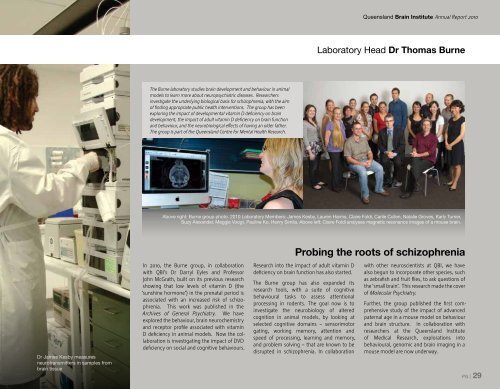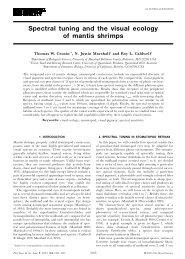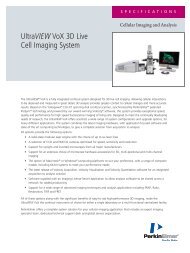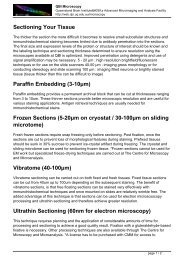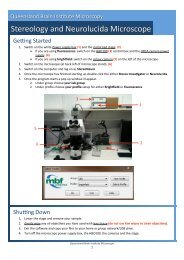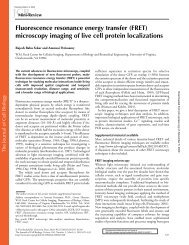Queensland Brain Institute 2010 Annual Report - University of ...
Queensland Brain Institute 2010 Annual Report - University of ...
Queensland Brain Institute 2010 Annual Report - University of ...
You also want an ePaper? Increase the reach of your titles
YUMPU automatically turns print PDFs into web optimized ePapers that Google loves.
<strong>Queensland</strong> <strong>Brain</strong> <strong>Institute</strong> <strong>Annual</strong> <strong>Report</strong> <strong>2010</strong>Laboratory Head Dr Thomas BurneThe Burne laboratory studies brain development and behaviour in animalmodels to learn more about neuropsychiatric diseases. Researchersinvestigate the underlying biological basis for schizophrenia, with the aim<strong>of</strong> finding appropriate public health interventions. The group has beenexploring the impact <strong>of</strong> developmental vitamin D deficiency on braindevelopment, the impact <strong>of</strong> adult vitamin D deficiency on brain functionand behaviour, and the neurobiological effects <strong>of</strong> having an older father.The group is part <strong>of</strong> the <strong>Queensland</strong> Centre for Mental Health Research.Above right: Burne group photo. <strong>2010</strong> Laboratory Members: James Kesby, Lauren Harms, Claire Foldi, Carlie Cullen, Natalie Groves, Karly Turner,Suzy Alexander, Meggie Voogt, Pauline Ko, Henry Simila. Above left: Claire Foldi analyses magnetic resonance images <strong>of</strong> a mouse brain.Dr James Kesby measuresneurotransmitters in samples frombrain tissueIn <strong>2010</strong>, the Burne group, in collaborationwith QBI’s Dr Darryl Eyles and Pr<strong>of</strong>essorJohn McGrath, built on its previous researchshowing that low levels <strong>of</strong> vitamin D (the‘sunshine hormone’) in the prenatal period isassociated with an increased risk <strong>of</strong> schizophrenia.This work was published in theArchives <strong>of</strong> General Psychiatry. We haveexplored the behaviour, brain neurochemistryand receptor pr<strong>of</strong>ile associated with vitaminD deficiency in animal models. Now the collaborationis investigating the impact <strong>of</strong> DVDdeficiency on social and cognitive behaviours.Probing the roots <strong>of</strong> schizophreniaResearch into the impact <strong>of</strong> adult vitamin Ddeficiency on brain function has also started.The Burne group has also expanded itsresearch tools, with a suite <strong>of</strong> cognitivebehavioural tasks to assess attentionalprocessing in rodents. The goal now is toinvestigate the neurobiology <strong>of</strong> alteredcognition in animal models, by looking atselected cognitive domains – sensorimotorgating, working memory, attention andspeed <strong>of</strong> processing, learning and memory,and problem solving – that are known to bedisrupted in schizophrenia. In collaborationwith other neuroscientists at QBI, we havealso begun to incorporate other species, suchas zebrafish and fruit flies, to ask questions <strong>of</strong>the ‘small brain’. This research made the cover<strong>of</strong> Molecular Psychiatry.Further, the group published the first comprehensivestudy <strong>of</strong> the impact <strong>of</strong> advancedpaternal age in a mouse model on behaviourand brain structure. In collaboration withresearchers at the <strong>Queensland</strong> <strong>Institute</strong><strong>of</strong> Medical Research, explorations intobehavioural, genomic and brain imaging in amouse model are now underway.PG | 29


